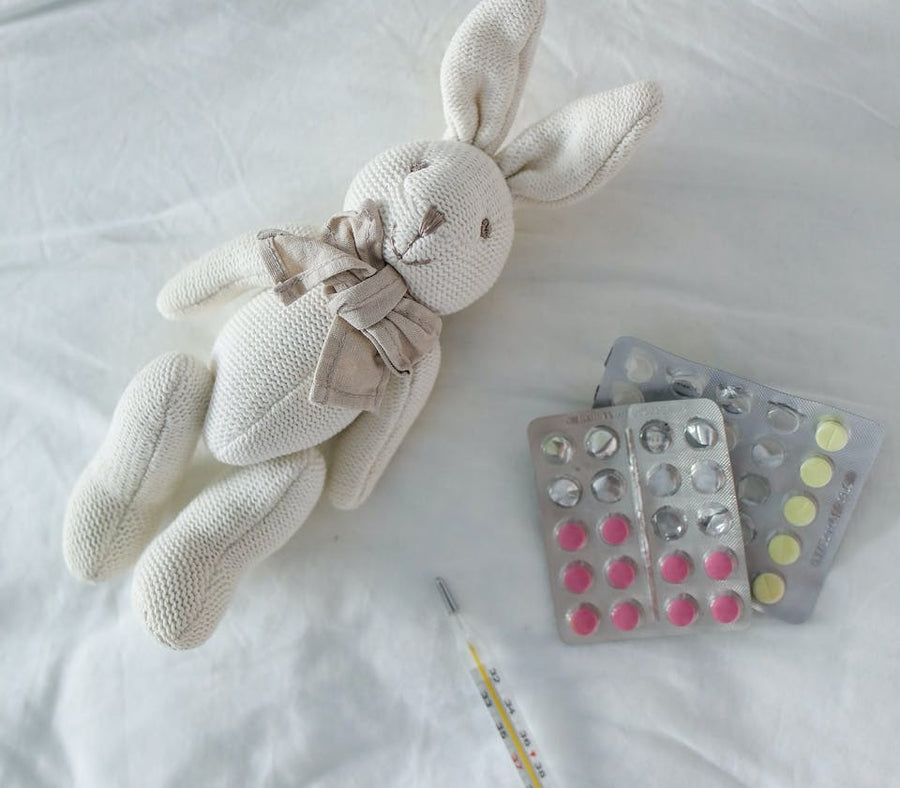What OTC Medications Should I Avoid During IVF?

When I was undergoing IVF – a very time-consuming and expensive procedure – I wanted to make sure everything went smoothly to increase my chances of success. I followed a healthy diet, took my supplements daily, and followed my doctor’s instructions to a T. But I had a lot of questions about what I could and could not do during IVF, including if it was safe to take my allergy medications or an over-the-counter (OTC) pain reliever.
In this article, I will share what medications should be avoided during IVF, what over-the-counter medications can be safely taken, and whether or not prescription medications and antidepressants are safe to take during IVF. Of course, it’s always best to discuss with your healthcare provider before starting or stopping any medication.
OTC Medications and IVF
When drugs and medications are ingested, they enter the bloodstream and can have various effects on the body. [1] In some cases, certain medications may directly impact fertility treatment outcomes or cause birth defects. [2] As you prepare to start your IVF cycle, make a list of all the medications (OTC and prescription) you currently take and share it with your healthcare provider. This list should include:
- Any prescriptions you are currently taking
- Any OTC medications you are taking, or thinking about taking
- Supplements you are taking, or thinking about taking
Can I Take OTC Pain Relievers During IVF?
Some people experience pain and discomfort during IVF, whether it be from injections, bloating, or discomfort during egg retrieval. So you may be wondering what pain relievers are safe to take during IVF. Multiple studies have shown somewhat conflicting results regarding what OTC medications are safe and unsafe.
Acetaminophen (Tylenol®, regular or extra strength) is generally regarded as safe to use during IVF to relieve pain or reduce fever. [3,4]
There are mixed results from studies when determining whether nonsteroidal anti-inflammatory drugs (NSAIDs) such as ibuprofen (Advil®, Midol®, and Motrin®), naproxen (Aleve®), and aspirin are safe. [3,4] Some clinics say you can take ibuprofen (Advil®, Motrin®) and naproxen (Aleve®) during stimulation, but need to stop on the day of your hCG or “trigger” shot day. [5]
If you need to take pain medication during IVF, talk to your provider about which medications are safe to use. It is important to follow your clinic’s instructions regarding pain management during IVF and to communicate any concerns or questions you may have.
Can I Take OTC Allergy Medication or Decongestants During IVF?
Allergies can be particularly bothersome during IVF, but some over-the-counter (OTC) allergy medications may not be recommended during IVF.
Antihistamines are a type of medication commonly used to treat allergy symptoms such as sneezing, itching, and runny nose. They work by blocking the action of histamine, a chemical released by the body during an allergic reaction. Some clinics suggest avoiding antihistamines such as Allegra®, Claritin®, and Zyrtec®. [6-7] And at least one clinic says okay to Benadryl®. [8]
Before taking any allergy medication, it is always best to consult with your healthcare provider to ensure its safety and compatibility with your IVF treatment.
Can I Take a Prenatal During IVF?
If you’re not already taking a prenatal vitamin, it’s important to start taking one now!
A Harvard study led by Dr. Audrey Gaskins evaluated the relationship between pretreatment adherence to various dietary patterns and outcomes of fertility treatments across 357 women and 608 cycles, like IVF. The study found that adherence to a pro-fertility diet was associated with an increased probability of live birth. The pro-fertility diet was developed based on factors previously related to outcomes and included a higher intake of supplemental folic acid (folate), vitamin B12, vitamin D, low (rather than high) pesticide residue produce, whole grains, dairy, soy foods, and seafood (rather than other meats). [9]
The Natalist Prenatal Daily Packets formula intentionally includes nutrients found in the pro-fertility diet: folate, vitamin B12, and vitamin D. In fact, it contains levels of folate, vitamin B12, and vitamin D that meet or exceed the levels shown to support positive fertility outcomes in this particular study. [9]
Can I Take Antioxidants During IVF?
Antioxidants are organic nutrients that reduce oxidative damage. They include vitamins, minerals, and polyunsaturated fatty acids (PUFAs). Some of the common antioxidants used to help support fertility in women are CoQ10, N‐acetyl‐cysteine, melatonin, vitamins A, C and E, folate, myo‐inositol, zinc, and selenium. [10]
A Cochrane systematic review of 50 clinical trials involving 6,510 women found that antioxidants may be associated with an increased live birth rate for women with infertility. Specifically, for women with an expected live birth rate of 20%, using antioxidants increased the live birth rate to 26%-43%. [10]
But some antioxidants showed more promise than others. The study found that CoQ10 is associated with an increased pregnancy rate. But they found no evidence that melatonin, L‐arginine, myo‐inositol, or vitamin B complex improves pregnancy rate. However, the studies were deemed “low quality,” and more research is needed. [10] As always, talk to your healthcare provider before starting a new supplement routine.
Can I Take Herbal Supplements During IVF?
While some herbal supplements are safe to take during IVF, others can interfere with fertility or harm a developing embryo. One study determined that there are bleeding risks associated with garlic, ginkgo, ginseng, green trea, saw palmetto, St John’s wort, and fish oil. [11] Cardiovascular instability was also observed with drugs such as ephedra, ginseng, and kava. [11] It’s important to discuss the use of all supplements, including herbal supplements, with your healthcare provider.
What Can I Take for Constipation During IVF?
Many patients complain about constipation during and after egg retrieval, which is likely related to the high levels of certain IVF hormones. [12] Fiber is a useful gastrointestinal supplement for nutrient absorption and regulation of blood sugar levels and is considered safe for use during IVF by multiple fertility clinics. [6,8] You can find dietary fiber in fruits, vegetables, and grains, but there are also readily available fiber supplements on the market. One review found soluble fiber improves constipation and the average number of bowel movements per week. [13]
What About Myo-inositol During IVF?
Myo-inositol is a member of the vitamin B group. It is found in foods such as fruits, beans, whole grains, and seeds, as well as in supplements. Myo-inositol is often recommended for patients with PCOS. [14] This is because women with PCOS are often insulin resistant, and myo-inositol may improve insulin sensitivity and reduce insulin levels. [14]
In a meta-analysis of six clinical trials involving 913 patients, patients who took myo-inositol saw a significantly higher pregnancy rate than the control group. [15] However, a Cochrane review concluded that there are too few quality studies to be certain if myo-inositol improves pregnancy rates or live birth for women with PCOS. [16]
If you have PCOS, talk to your healthcare provider about what supplements or medications are right for you.
Should I Take CoQ10 During IVF?
Many clinics (like CCRM and Pacific Fertility Center) suggest CoQ10 supplementation to support egg quality, but you should ask your reproductive endocrinologist (REI) or another healthcare provider if it makes sense in your specific situation. [17-19]
Prescription Medications During IVF
Can I Take Antidepressants While Undergoing IVF?
Antidepressants are commonly prescribed medications for the treatment of depression and anxiety. And it turns out that 11% of women undergoing IVF are also taking depression medication. [20] However, there is not much research on the safety of some antidepressants during IVF.
One study published in the Harvard Review of Psychiatry found no statistically significant differences in IVF related variables among women taking antidepressants compared to a matched comparison group, although fewer women taking antidepressants got pregnant. [20]
Another study from clinicians at RMA analyzed the relationship between maternal selective serotonin reuptake inhibitors (SSRI) exposure and blastocyst development in 7,722 IVF cycles. They found no differences in the number of eggs retrieved, fertilized, or embryos cryopreserved. The authors concluded that it’s safe to continue taking SSRIs during IVF. [21]
However, there is little to no research on other types of antidepressants, such as tricyclic antidepressants, monoamine oxidase inhibitors (MAOIs), and benzodiazepines such as alprazolam (Xanax®), diazepam (Valium®) and clonazepam (Klonopin®). It is best to talk to your healthcare provider about how to manage your medication during IVF. They may recommend continuing your medication or switching to a safer alternative.
Can I Take Other Prescription Medications During IVF?
If you are taking any prescription medications, it is important to talk to your provider about how to manage your medication during IVF. Your provider may recommend temporarily stopping or adjusting your medication during the IVF process, depending on your health history and the specific medication.
Summing it Up
IVF requires careful management and attention to detail, including what prescription or OTC medications can be taken during the process. Certain medications should be avoided during IVF, while others may be necessary to support a healthy pregnancy. If you need to take non-IVF medication during IVF, talk to your healthcare provider about which medications are safe to use and how to manage your medication during the IVF process. Wishing you all the best!
References:
- Alagga AA, Gupta V. Drug Absorption. [Updated 2022 Jun 23]. In: StatPearls [Internet]. Treasure Island (FL): StatPearls Publishing; 2023 Jan-. Available from: https://www.ncbi.nlm.nih.gov/books/NBK557405/
- Preparing for ART. CDC. March 21 2023. URL. Accessed June 2023.
- Pre-conceptual Q&A. Santa Barbara Fertility. Accessed May 2023. URL.
- Jukic AMZ, Padiyara P, Bracken MB, McConnaughey DR, Steiner AZ. Analgesic use at ovulation and implantation and human fertility. Am J Obstet Gynecol. 2020;222(5):476.e1-476.e11. doi:10.1016/j.ajog.2019.11.1251
- In vitro fertilization (IVF) treatment cycle start instructions. The University of Iowa Hospitals and Clinics. Accessed May 2023.
- What OTC Medications Should I Avoid During IVF? LAIVF. Accessed May 2023.
- Dealing with Spring Allergies while TTC. Santa Monica Fertility. Accessed May 2023.
- IVF Frequently Asked Questions. Bluegrass Fertility Center. Accessed May 2023.
- Gaskins AJ, Nassan FL, Chiu YH, et al. Dietary patterns and outcomes of assisted reproduction. Am J Obstet Gynecol. 2019;220(6):567.e1-567.e18. doi:10.1016/j.ajog.2019.02.004
- Showell MG, Mackenzie-Proctor R, Jordan V, Hart RJ. Antioxidants for female subfertility. Cochrane Database Syst Rev. 2017;7(7):CD007807. Published 2017 Jul 28. doi:10.1002/14651858.CD007807.pub3
- Wang C-Z, Moss J, Yuan C-S. Commonly Used Dietary Supplements on Coagulation Function during Surgery. Medicines. 2015; 2(3):157-185. https://doi.org/10.3390/medicines2030157
- Xiao ZL, Pricolo V, Biancani P, Behar J. Role of progesterone signaling in the regulation of G-protein levels in female chronic constipation. Gastroenterology. 2005;128(3):667-675. doi:10.1053/j.gastro.2004.12.001
- Suares NC, Ford AC. Systematic review: the effects of fibre in the management of chronic idiopathic constipation. Aliment Pharmacol Ther. 2011;33(8):895-901. doi:10.1111/j.1365-2036.2011.04602.x
- Kamenov Z, Gateva A. Inositols in PCOS. Molecules. 2020;25(23):5566. Published 2020 Nov 27. doi:10.3390/molecules25235566
- Zheng X, Lin D, Zhang Y, et al. Inositol supplement improves clinical pregnancy rate in infertile women undergoing ovulation induction for ICSI or IVF-ET. Medicine (Baltimore). 2017;96(49):e8842. doi:10.1097/MD.0000000000008842
- Showell MG, Mackenzie-Proctor R, Jordan V, Hodgson R, Farquhar C. Inositol for subfertile women with polycystic ovary syndrome. Cochrane Database of Systematic Reviews 2018, Issue 12. Art. No.: CD012378. DOI: 10.1002/14651858.CD012378.pub2
- 12 Things to Try Before Turning to IVF. CCRM. Accessed May 2023. URL.
- Can You Do Anything To Boost Your Fertility? Pacific Fertility Center. Accessed May 2023.
- Giannubilo SR, Orlando P, Silvestri S, et al. CoQ10 Supplementation in Patients Undergoing IVF-ET: The Relationship with Follicular Fluid Content and Oocyte Maturity. Antioxidants (Basel). 2018;7(10):141. Published 2018 Oct 13. doi:10.3390/antiox7100141
- Sylvester C, Menke M, Gopalan P. Selective Serotonin Reuptake Inhibitors and Fertility: Considerations for Couples Trying to Conceive. Harv Rev Psychiatry. 2019;27(2):108-118. doi:10.1097/HRP.0000000000000204
- Hernandez-Nieto C.A., Lee JA, Sekhon L, et all. Selective serotonin reuptake inhibitors exposure prior to art treatment does not affect blastulation rate. Fertility & Sterility. VOLUME 108, ISSUE 3, SUPPLEMENT , E93, SEPTEMBER 2017. DOI:https://doi.org/10.1016/j.fertnstert.2017.07.287
Reach Out, We're Here
Have questions about your order or products? For the speediest answer, check out our FAQ section. Need something else? Come find us below.
Please keep in mind our regular business hours; Monday-Friday, 9am-5pm CT.
Customer Support
support@natalist.com
Press Inquiries
media@everlyhealth.com
Business & Partnerships
team@natalist.com
Affiliates + Influencers
team@natalist.com
Job Openings
Careers Page
























